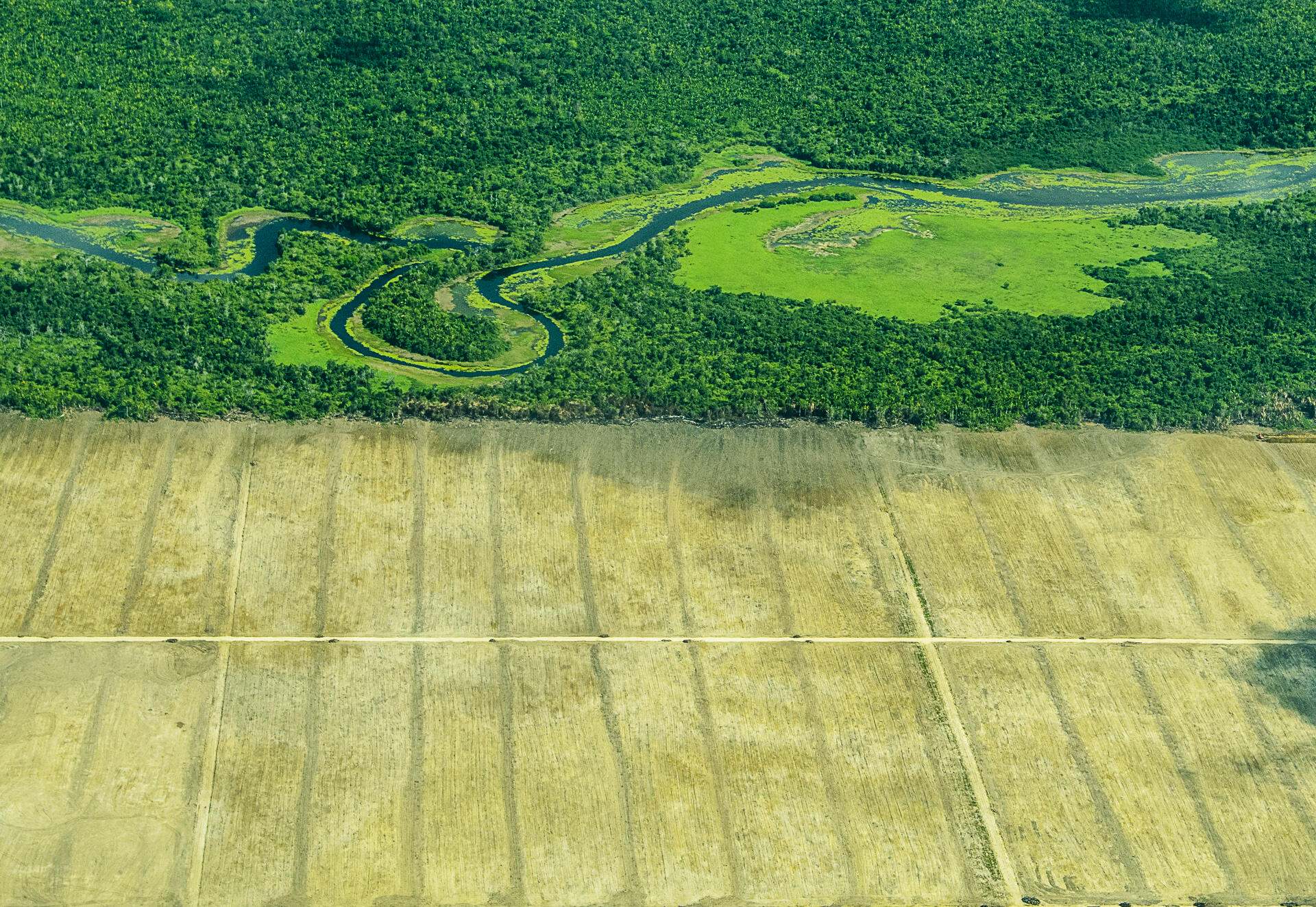
Border between Belize and Guatemala. Copyright © Roberto Bueno/TNC Photo Contest 2021
As COP 16 begins, Stephanie Kimball, Senior Director of Climate Strategy at Conservation International quizzes Sue Reid, Climate Finance Advisor to Christiana Figueres, on how we can best shift financial flows towards a nature-positive future, and how action on deforestation is the most crucial and proven step financial institutions can take as part of an integrated approach to reducing climate and nature-related risks.
Read more
Related articles for further reading
Stephanie: “Investors are increasingly aware that their portfolios are dependent on nature, and excitement around investing to protect and restore the natural world is building. But is this making an impact towards a nature-positive future?”
Sue: “It’s encouraging that investors are increasingly taking action to reduce nature-related risks and allocating to nature-based solutions, but as of yet these are a drop in the ocean. Overall, private finance flowing to drivers of nature loss, and correspondingly accelerating climate change, still overwhelms finance that is aligned with restoring, protecting and managing nature while limiting and mitigating climate impacts. We need to see far more focus on shifting finance away from projects and activities that are destroying nature, and scaling finance to support thriving and resilient natural ecosystems on which people and economies depend.
The good news is there are proven and demonstrably impactful actions that investors can take to shift financial flows in the right direction – in particular through a focus on ending deforestation. Taking action to eliminate deforestation risk exposures is something investors and lenders really have to do anyway, simply to manage their risk profile and as part of their fiduciary duty to protect their clients’ assets. It’s also essential for meeting net zero emissions targets.”

SUE REID, Climate Finance Advisor, has two decades of experience as a solutions-oriented advocate and specialist regarding climate, clean energy and nature-related policies, practices and investments, Sue serves as Climate Finance Advisor to Christiana Figueres at Global Optimism. In this role, she works to drive ambition of the UN-convened Net Zero Asset Owner Alliance, represents Global Optimism on the Glasgow Financial Alliance for Net Zero (GFANZ) Advisory Panel, and supports financial institution uptake of The Climate Pledge – a leadership opportunity for companies committed to achieve carbon neutrality by 2040. In addition, Sue serves on the Finance and Deforestation Advisory Group and guides implementation of the Finance Sector Deforestation Action initiative. Sue previously served as co-lead of the COP26 High Level Champions Finance Team, where she worked to catalyze finance sector uptake of robust commitments and actions aligned with achieving net zero emissions. She also served as Vice President of Climate & Energy at Ceres, where she helped develop and implement the investor-led Climate Action 100+ initiative. Sue also previously led the Massachusetts Advocacy Center Director at the Conservation Law Foundation, and worked as an intellectual property litigation attorney in Silicon Valley and Boston.
Stephanie: “But deforestation is a climate issue. Isn’t ending deforestation something that institutional finance should have fully integrated into transition plans by now?”
Sue: “Yes, deforestation is very much a climate issue, and halting deforestation is a crucial component of any credible net zero transition plan. If deforestation were a country it would be the 3rd largest emitter behind the US and China. Although there are encouraging pockets of progress on halting deforestation in some key regions, deforestation is still on the rise globally. For example, deforestation in the Brazilian Cerrado rose to record levels last year – increasing by 43% from 2022. The annual rate of deforestation needs to be reduced four times faster than the current pace of progress over this decade if we are to end and reverse deforestation by 2030.
Acting on deforestation is the most crucial step financial institutions can take as part of an integrated approach to reducing climate and nature-related risks, and both the Glasgow Financial Alliance for Net Zero (GFANZ) Net Zero Transition Plan guidance and the Investor Agenda’s Expectations and Guidance for Investor Climate Action Plans include a focus on the issue. The 2024 Global Investor Statement to Governments on the Climate Crisis also calls for action to halt and reverse deforestation by 2030.
However, recent data shows that over half of financial institutions still do not even have a policy on deforestation. We urgently need to close this gap.”
Stephanie: “It sounds like a lot of investors are not only putting their clients’ assets at risk but – as I understand, also supporting companies likely to contravene new legal requirements unless they shift business models?”
Sue: “Yes, The EU Deforestation Regulation (EUDR) requires companies accessing the EU market to prove that their products do not originate from recently deforested land or have contributed to forest degradation. This will have considerable impact on exposed companies across portfolios, and similar forest-protective laws and policies are anticipated to follow in other markets and geographies.
It’s not just legislation like the EUDR that means investors really have to act. Mandatory disclosure on nature-related dependencies, impacts, risks and opportunities also is in the cards, and the recommendations of the Taskforce on Nature-related Financial Disclosures (TNFD) — already adopted by over 400 organisations — provides a framework for doing this even where mandates are not yet in place.”
Stephanie: “Surely not all investors are failing to act? Some must be wise to the risks (and opportunities) and be working towards ending deforestation?”
Sue: “Absolutely. A growing, but still small, group of investors are actively working to tackle deforestation risk exposures. Among other things, they are engaging with portfolio companies to encourage them to transition their business models so they no longer rely on commodity production tied to deforestation, and instead embrace sustainable production and supply chains.
The 30+ members of Finance Sector Deforestation Action initiative are leading the way, having committed to use best efforts toward eliminating soft commodity-driven deforestation from their portfolios by 2025. This leading group of financial institutions have been leaning into the challenges and opportunities, and have driven tangible progress elevating deforestation action up the agenda at companies and among policymakers and data providers. Together with the Institutional Investors Group on Climate Change (IIGCC), they also have set expectations for commercial and investment banks for eliminating commodity-driven deforestation.
These investors alone will not move markets at the scale required to systematically halt deforestation and conversion of natural ecosystems by 2030. Indeed, it is long past time for finance sector deforestation action to move fully into the mainstream.
The early movers have demonstrated that it is feasible to take meaningful action to address deforestation risk exposures. The toolkit for finance sector action on deforestation has been maturing and is quite robust. Now, at the very least, all financial institutions who have not already done so need to commit to make a start on tackling deforestation, set a deforestation policy within the next year, and centrally integrate deforestation action into their net zero transition plans before COP 30 — all in alignment with the global goal of eliminating deforestation and conversion of natural ecosystems by 2030.”

*STEPHANIE KIMBALL, Senior Director of Climate Strategy at Conservation International, leads global initiatives to align climate action across policy, finance, and nature-based solutions projects to achieve gigaton-scale carbon dioxide reductions and removals. Stephanie serves on the Nature4Climate steering committee, and drives forward the Finance and Deforestation Advisory Group that supports finance institutions in reducing deforestation risk in their portfolios. She previously worked on international climate and biodiversity policy. Her graduate studies at Johns Hopkins focused on climate science and policy, with research on ecosystem-based adaptation policy and science in the Global South.
Stephanie: “Institutional shareholders are undoubtedly a powerful force over private markets with the potential to drive change across deforestation-exposed supply chains like soy, beef, palm oil, pulp and paper. But surely private finance alone can’t shift the global economy so it fully supports nature and climate?”
Sue: “Private finance has the potential to make a huge impact on transforming deforestation-linked supply chains. Engaging with portfolio companies is just one tack. Engaging with governments is another. Without the right enabling environment in terms of policy it will be harder for businesses to transition to sustainable deforestation-free production of commodities. So finance sector engagement through the likes of IPDD, the Investors Policy Dialogue on Deforestation, a group of 80+ financial institutions from 21 countries, is crucial too.
And yes, finance sector action alone is not enough. We need to see a joined-up approach for tackling deforestation and land degradation from governments, policy makers, businesses and civil society.”
Stephanie: “So what is the first step for an investor who realises they have no choice but to play catch up on this issue?”
Sue: “No one needs to start from scratch or reinvent the wheel; there are lots of data sources and tools, target-setting guidance, frameworks and organisations situated to help investors find their way.
To begin, investors should take a look at the Finance Sector Roadmap for tackling commodity-driven deforestation – a tried and tested guide to support investor action to phase out deforestation exposure. When it comes to accessing the best data, investors’ first port of call should be Forest IQ. And on the very near horizon is a transformative new initiative, known as DEFT Pathway, or Deforestation-free Transition Pathway, which will help financial institutions to better engage on deforestation, categorizing companies according to their level of progress and synthesizing existing frameworks, guidance and metrics into actionable next steps.”